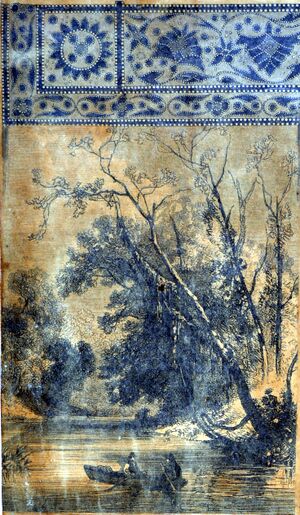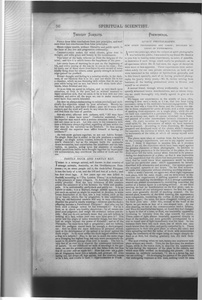
Two in the boat on the lake
Partly Duck and Partly Rat
There is a strange animal, well known in that country of strange animals, Australia, as the Ornithornycus Paradoxus; or, as some people call it, the duck-billed Platypus. It has the body of a rat, and the bill and feet of a duck; and has four short legs. A few years ago one was killed in Norfolk, according to “The London Times,” in a duck-pond, in the presence of many villagers. In Australia they are tolerably plentiful. Now the very existence of this creature proves the existence of a link between the birds and quadrupeds. It is, undoubtedly, partly duck and partly rat. It is no hybrid or mule; it is a distinct, though middle species; it is just such an animal as might be expected to develop, in some future descendant of its race, into a true rodent, such as the rat or beaver, which, like its progenitor, is also amphibious. This, my old-fashioned readers will say, is very ridiculous! Besides the proof is wholly wanting,— whoever saw the duck's offspring become a Paradoxical Platypus? And who can believe such a change unless he has witnessed it? Far be it from us to check any healthy skepticism; by all means suspend your judgment, and weigh the evidence before you decide. But you do not seriously mean that you will believe in nothing as a fact, unless your own eyes have seen it? You never saw the origin of many wonderful things, but they have had an origin beyond the power of disbelief; and so of the Platypus,— be must have had a progenitor; and we believe, were his pedigree traced back far enough, a duck-progenitor. And we think the mere deficiency of personal attendance at the development of the animal it no proof against his dock origin. Is he more unlike his duck-legged relation than a frog to a tadpole? Nay, is he not in much the same stage as a changing but legless frog, bat only more permanently delayed in its middle passage from bird to mouse. The fact is, very few of us ever try to observe the commonest operations of nature. In our childhood we walk of mornings in the gardens, we see the ground strewn with the fallen fruit, but how few of as ever saw an apple fall! How few ever see a globule of frogspawn burst into a tadpole, and grow on till arms spring out, tail drops off, legs appear, and the creature ceases to be a fish, and crawls to land. — Approximation to Truth.
Spirit Photography
About two years ago. when the subject of spirit photographs was before the public, I was asked by my friend Mr. Beattie to join him in making some experiments, in order, if possible, to determine if such things could really be produced; as in all specimens which Mr. B. had-seen, the signs of deception were more or less apparent These experiments were undertaken solely for our own private satisfaction, as both of us were interested in the subject of Spiritualism generally, and in this branch specially, each of us having practiced photography for nearly thirty years,— Mr. B., before retiring from business, as the leading professional artist in Bristol, and myself as an amateur.
A mutual friend, through whose mediumship we had frequently witnessed trance manifestations, and on whose integrity we could thoroughly rely, kindly agreed to give us his services.
We began our experiments in the middle of June, 1872, meeting at first once a week, at 6 p.m., that late hour Leing necessary owing to the medium’s business engagements. The lens we used was a Ross 6-in. focus, and the camera one similar to those employed for cartes de visite, with a slide capable of marking three exposures on a single plate; while the silver bath was contained in a porcelain tray. The back ground was an ordinary one, made of canvas stretched on a frame, and painted of a color intermediate between cinnamon and slate. On every occasion we began by sitting together at a small table, by the movements of which we were informed how to proceed. According to these directions. Mr. Beattie prepared and developed most of the plates, while I managed the exposure, the duration of which was invariably regulated by movements of the table, at which all except myself were seated.
The plates were taken at random from the batch provided for the evening’s experiments, and not in any regular succession. I think it important to mention this, as it answers most, if not all, the objections which have been urged against the genuine character of these photographs. In addition to the foregoing precaution in the selection of the plates, the medium never left the table, except when directed to be present during the development of a plate; so that it was impossible on the supposition that the plates had been previously manipulated, that he could know what appearance would be developed on any particular plate: which appearances he latterly described with minuteness and accuracy. Our seances generally occupied upwards of two hours. On the first occasion we made nine exposures without obtaining anything unusual.
After a week's interval, we again met, when eight exposures took place, with the same result; and we determined to discontinue our experiments if nothing appeared on the ninth. However, on applying the developer to it, a strange appearance started out, almost instantaneously, resembling somewhat the outline of a human figure in a stooping attitude. At our third meeting, we had no manifestation on the first plate; and, indeed, at almost all our subsequent seances the first few exposures were generally devoid of anything unusual. On the second plate, however, of the third evening, the appearances were remarkable, resembling the cutline of the upper part of a female figure; the same, but more elongated, coming out on the third plate also. After this, instead of the head of the figure, we got more, or less of a star-shaped form. At our next meeting, we had at the commencement twelve failures, and when the manifestations began, we found they had changed in figure to that of a cone, or flask, the luminosity apparently increasing in intensity from the edge towards the centre. These cones of light almost invariably appeared directly in front of the medium, and were generally accompanied by a star or round spot of light immediately over his head. In one instance there were two such stars, one of which was very much fainter than the other, and partly concealed by it. These appearances in their turn gave place to others, the cones and stars spreading out into the forms of birds with outstretched wings, the luminosity of the edges being no longer sharply defined as at first, but shading gradually into the dark background.
The next evening, when we met, twenty-one exposures took place without any result. Then, for the first time, the medium began, while in the trance state, to describe the appearances he saw during the exposure of the plate in the camera, and which were fully verified on developing the picture. On one occasion he suddenly exclaimed, “I am in a dense fog, and can see nothing.” On developing the portion of the plate which was undergoing exposure at this time, nothing could be seen on it, the whole surface being completely fogged. Shortly after this, he described a human figure completely surrounded by fog, and, on developing the plate, we found a faint, though perfectly discernible, outline of what appeared to be a female figure. On another occasion, last year, when I chanced to be seated at the table, he described a female figure as standing beside me, the rude outline of which came out strongly on development. From this time the appearances were almost invariably described during the exposure of the plate, and in every case with minuteness and accuracy.
Last year, the manifestations were more varied in form than those previous, one of the most curious being a luminous star about the size of a three-penny piece, in the centre of which, and separated from the points by a dark border, was the figure of a medallion bust, described as such by the medium.
At the same seance he suddenly called our attention to a very bright light, and pointed to it. He seemed astonished that none of us saw it. The plate, when developed, showed the light, and his finger directed towards it.
Any one who has examined the complete series of these photographs must have remarked that in most of them the forms represented appear to pass through a sort of gradual development, commencing with a small luminous surface, which by degrees increases in extent, undergoing, at the same time, a modification in shape, this latter change being often caused by the coalescing of two portions originally separate.
During our experiments, Mr. Beattie often remarked the suddenness with which these forms appeared on the plates when the developer was applied, coming out very much in advance of the ordinary impression on the plates. And I have been informed by others who have experimented in the matter that they have met with the same peculiarity.
Frequently, towards the close of the day’s experiments, when the light had become very weak, we found, on developing, that nothing was impressed on the plates except the forms of these invisible emanations, showing that, though unable to affect our eyes, the power of acting on the prepared plate was still strong. In fact, to all intents, we were photographing in the dark, as the visible light reflected from the objects in the room failed to affect in the smallest degree the sensitive film. This circumstance suggested to me the idea of endeavoring to discover whether or not the ultra-violet rays of the spectrum might have any influence in the production of these effects; and, with this end in view, I propose that we should expose, In the direction in which the medium described the luminous appearances, paper prepared with some fluorescent substance. I accordingly immersed one-half of a sheet of blotting paper in a solution of quinine, the other half remaining attached to the prepared half, in order that we might the more easily perceive any effect which might arise from the presence of the quinine. I was unable to be present at the seance at which the experiment was made, and which was our last, but Mr. Beattie exposed the paper in the position I proposed, without, however, obtaining any result.
When we resume our experiments, which we hope to do soon, we will endeavor to follow out this interesting part of the subject.—M. A. (Oxon) in Human Nature.
<... continues on page 5-54 >
Editor's notes
- ↑ Two in the boat on the lake by unknown author. Decoration partly appended by HPB
- ↑ Partly Duck and Partly Rat by unknown author, Spiritual Scientist, v. 1, No. 5, October 8, 1874, p. 56. Signed: Approximation to Truth
- ↑ Spirit Photography by Moses, W. S. (signed as M. A. (Oxon) in Human Nature), Spiritual Scientist, v. 1, No. 5, October 8, 1874, pp. 56-7
Sources
-
Spiritual Scientist, v. 1, No. 5, October 8, 1874, p. 56

